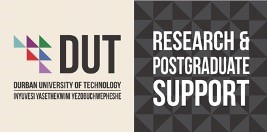- RPS Home Scholarly Publishing Research and Innovation Reports Grants ManagementGrants Management Bursaries and Scholarships DUT Equipment List External Funding Opportunities Recommendation from Host for PDF/RA/RF: Contract Renewal Post-Doctoral Fellow Application Form Post-Doctoral Fellow Registration Form Post-Doctoral Fellow Progress Report Form Research Funding Rated Researchers Scholarships CommitteeResearch Capacity DevelopmentResearch Capacity Development Application for Gatekeeper Permission AJIMS DUT Research Focus Areas Conference Application Research and Innovation Conference Short Learning ProgrammePostgraduate Research ResourcesHigher Degree Research Module Research MOOC English for Research Purposes: Course English for Research Purposes: Selected Papers Research MattersInstitutional Research Ethics Research Information ManagementResearch Outputs Policies Outputs Submission Criteria Research Tools Symplectic Elements Researcher Identifiers / ORCID Deadlines: Outputs Submissions IncentivesPolicies and GuidelinesDUT Research and Innovation Blueprint 2030 Policy for Postdoctoral Fellows DUT Policies and Guidelines Supervision PolicyPostgraduate Student Guide and Forms Research and Innovation Newsletter Feedback Questionnaire
SHORT LEARNING PROGRAMME: POST-GRADUATE INNOVATION, ENTREPRENEURSHIP AND RESEARCH COMMERCIALISATION
COURSE OVERVIEW:The purpose of the course is to develop entrepreneurial capabilities and capacitate postgraduate students and academic staff to be more successful in innovation, research commercialisation, teaching, and engagement in practice. The course systematically develops the competencies of participants in third-mission Entrepreneurship, innovation, and research commercialization and in so doing, begins with a sensitization of participants to the importance of an entrepreneurial mind-set and the requirements for high levels of proactiveness, improved networking skills and enhanced abilities to leverage research resources, amongst students. |
START DATE: 1 JULY 2021Enroll by 25 June 2021. COST: R30 000 |
IS THIS COURSE FOR YOU?
Participants will acquire an understanding of critical practices in entrepreneurship in a university context through the application of venturing principles and other closely related concepts. The course emphasizes the importance of an entrepreneurial mind-set. As a mindset, entrepreneurship has assumed a unique position globally because of its empowering and transformational potential. Participants will be exposed to evidence-based research to gain insight into entrepreneurial and research commercialisation processes. The entrepreneurial process will be navigated practically in order to develop competencies required at each phase of the post-graduate journey, which includes leveraging resources and improving networking skills. The course also has motivational value where participants will identify sources of entrepreneurial research opportunity and design a road map to act innovatively.
WHAT WILL SET YOU APART
On completion of this course, you’ll walk away with:
- Determine critical practices in research and innovation in a university context
- Identify and describe key activities necessary to conduct and advance innovation or research
- Identify sources of research opportunity and design an action road map
- Apply the entrepreneurial process in relation to research and innovation
- Critically Assess the relevance of an entrepreneurial orientation in a university setting
- Develop an entrepreneurial mind-set and adopt entrepreneurial behaviour
- Engage in ‘learning by doing’ activities through presenting to a panel
- Critically apply entrepreneurship principles to improve research productivity
COURSE CURRICULUM
The course has been specifically developed for students at the postgraduate diploma level or NQF level 7 as a short program i.e., to be delivered within a 12-Week period. The course comprises 8 chronological and incrementally conceptualised modules that all students should take part in and complete, to be able to gain eligibility for the certificate of attendance that will be provided by the Durban University of Technology Research and Postgraduate Support Directorate. Details of course include: –
Coursework 1: Personal and Environmental Entrepreneurial dynamics within Research and Innovation.
Coursework 2: The individual entrepreneur: A focus on research and innovation tools
Coursework 3: Entrepreneurial opportunities and resource management within research contexts
Coursework 4: Building Your Enterprise Through Networks
Coursework 5: Techniques of Transforming University Academic Research into Innovation and Entrepreneurship.
Coursework 6: Functional Areas of Your Enterprise [Marketing, Operations and Finance]
Coursework 7: Technological development from academic entrepreneurship and innovation.
Coursework 8: Social Entrepreneurship: Building Enterprises for Social Change
COURSE CONVENOR
The design of this online short course is guided by the Research and Postgraduate Support Directorate, as well as industry experts, who will share their experience and in-depth knowledge with you throughout the course.
ABOUT THE CERTIFICATE
A hybrid assessment protocol that includes both formative and summative assessments will be used. This will comprise of
- Weekly individual and group exercises and tasks
- Group and individual assignments
- Open and closed bookcase study integrative assessments and a summative capstone assignment.
To complete the short learning programme successfully, and be awarded a certificate, learners must be found competent in all aspects of the summative assessment.
Your certificate will be issued in your legal name and sent to you upon successful completion of the course, as per the stipulated requirements.


